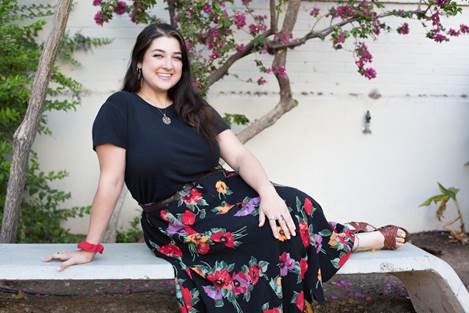Communication graduate stays in the ASU family with first job

Marleigh Hurlburt graduated from ASU with a Bachelor of Arts in communication and a minor in philosophy in 2018. Photo by Philamer Batangan
Marleigh Hurlburt graduated from Arizona State University with a Bachelor of Arts in communication and a minor in philosophy in 2018. She now works at the ASU Foundation as an event coordinator. ASU Now asked her a few questions about her time as a student and what life is like as an alumna.
Question: What do you like about your job?
Answer: I like this job because it carries on the ASU mission of inclusion and teamwork. Continuing to be a part of ASU also comes with amazing perks, including the ability and flexibility to go back to school! I am now pursuing a master's degree in social and cultural pedagogy through the School of Social Transformation.
Q: What was your "aha" moment, when you realized you wanted to study the field you majored in?
A: My Hugh Downs School communication degree showed me the importance of communication between cultures, genders, backgrounds and experiences. It was my diving board into the world of pedagogical education. One of the greatest experiences in my field has been the power that communication can have — both good and bad. We can use communication to uplift or tear down the people around us. I have seen firsthand when mentoring ASU students how intuitive conversations can have lasting effects. It opens up our own world into a more comfortable place to be.
Q: What made you choose ASU?
A: I chose ASU because of the campus location, the cultures within it, and of course, the beautiful desert landscape.
Q: Is there a particular faculty member at ASU who was influential?
A: Dr. Kate Vawter was my mentor all throughout my undergrad. She led me and fellow students toward graduation even when we did not know if we were going to make it there.

Hugh Downs School graduate Marleigh Hurlburt.
Q: What were the most useful classes you took?
A: COM 494 Communication, Terrorism, and the Media (Gimbal), COM 310 Relational Communication (Stermetz), ABS 370 Ethics of Eating (Stotts) and DCE 294: Yoga II (Aminsobhani).
Q: How did this school help prepare you for your current career?
A: The Hugh Downs School helped me learn effective situational communication. There is not one communication method that fits across the spectrum. Learning about how to navigate through these spaces has immensely helped prepare me for my current career.
Q: When you were interviewing for your first job out of college, what experiences at this school did you talk about? Internships? Group projects? Study abroad?
A: I talked about mentoring ASU freshman and sophomore students through the LEAD program, planning and executing events, volunteering, and my time working in a nonprofit.
Q: Were you involved in any student organizations or clubs? Or athletics?
A: I was and am still involved with the ASU Provost LEAD program.
Q: What advice do you have for students who may be following your path?
A: Do what makes you fulfilled mentally and emotionally. Our lives are short and precious, but making moral and ethical decisions to navigate our everyday moments makes life last a little longer and taste a little sweeter. Also, focus on YOU and your growth first and foremost; you will see that the people around you will gradually follow suit. You will all be strong enough to lean on each other.
Putting off your homework brings way more stress and anxiety than pushing through it right then and there. Just push through!
Q: What's something you learned while at ASU — in the classroom or otherwise — that surprised you, or that changed your perspective?
A: Every single person possesses unique knowledge: There is something to learn from every voice. Listen.
Q: What was your favorite spot on campus, whether for studying, meeting friends or just thinking about life?
A: My favorite spot on campus is probably Old Main lawn by the fountain — enjoying the sunshine and listening to the water trickle.
Q: If someone gave you $40 million to solve one problem on our planet, what would you tackle?
A: The world is a big place. To make $40 million go to a problem on our planet, I would have to put it toward ocean cleanup efforts. The ocean is a lifeline for each of us, so I feel like cleaning up the ocean would have a lasting effect for all. I would want to do something with the sewage lines that lead into the ocean and catching the trash/contaminations from entering the water.
More Sun Devil community

A champion's gift: Donation from former Sun Devil helps renovate softball stadium
Jackie Vasquez-Lapan can hear the words today as clearly as she did 17 years ago.In 2008, Vasquez-Lapan was an outfielder on…

Student-led business organization celebrates community, Indigenous heritage
ASU has seen significant growth in Native American student enrollment in recent years. And yet, Native American students make up…

Remembering ASU physical chemist Andrew Chizmeshya
Andrew Chizmeshya, a computational chemist and materials scientist whose work spanned over three decades at Arizona State…

